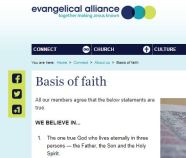Who guards the faith? October 6, 2017
Posted by Pete B in Uncategorized.trackback
Councils, Conferences and Creeds
We now live in a world of fake news and bias reporting. This isn’t new, its just that we talk about it a bit more. We also live in a world where there are a lot of different ideas about what Christianity is, not just about style and structure but about some deeper ideas, attitudes and practice.
This isn’t new either.
As Christianity spread it came into contact with new contexts and new ideas. The question of ‘whose religion’, or ‘whose version of the religion’ was true was an important one in an empire which risked fragmentation and in a church which risked distortions of the message, false gospels, and false churches.
New understanding of the faith are not just judged on their interpretation of scripture but on how they line up with agreed standard interpretation around key areas.
In the book of Acts and the Epistles the battle lines are drawn up first against the Judaisers and then against gnostics who believe they have additional secret knowledge.
(Some of the links in this post point to Wikipedia articles which can be changed by new editors and aren’t always free from bias and misinformation. Fortunately you can check sources, and look at discussion and history of articles)
The New Testament is not a witness to the fact that both historic faith and the new teachings of Jesus can be embraced by other cultures. They can also be reinterpreted and distorted. The faithful need to know when not to try to ‘pour new wine into old wineskins’ but also when to take a stand against false teaching.
Beyond the Epistles divisions arose about the nature of the trinity and even which books constituted the canon of scripture.
Historic creeds such as the Nicene Creed (depicted above) were formulated to clarify accepted truth and to draw boundaries.
In a much reprinted book on Handbook to Today’s World Religions, Josh Mcdowell repeatedly turned to the Westminster confession as a source of orthodoxy on countering cults. This statement of faith is also seen as a good yardstick by others.
Where do you look for a clear statements of what you and your church believe?
Unity, is not just about identifying where we all agree but also about how we handle differences.
 The UK Evangelical Alliance has affirmations and actions along with it’s basis of faith, including a statement: “We respect the diversity of culture, experience and doctrinal understanding that God grants to His people, and acknowledge that some differences over issues not essential to salvation may well remain until the end of time.”
The UK Evangelical Alliance has affirmations and actions along with it’s basis of faith, including a statement: “We respect the diversity of culture, experience and doctrinal understanding that God grants to His people, and acknowledge that some differences over issues not essential to salvation may well remain until the end of time.”
Bible translation brings with it risk of the message being changed and of people interpreting it for themselves. The English Authorised Version (also known as The KJV or King James Version) emerged when other versions had been prohibited.
According to a citation on Wikipedia, King James “gave the translators instructions intended to ensure that the new version would conform to the ecclesiology and reflect the episcopal structure of the Church of England and its belief in an ordained clergy.”
The Press office of the Church of England confirms this (or at least read the same wikipedia article).
Fortunately today respectable translators strive to avoid bias in favour of a particular doctrine.
This is not to say that doctrinal issues do not matter but that we should aim to let our understanding come from the Bible rather impose our ideas on the Bible.
This is of course easier said than done.
Even those who shout most loudly about the inerrancy of the Bible are at times forced to admit that the people who read it are sometimes wrong, either in assuming what it meant to the original authors and readers or in how it might be applied in a specific context today.
Ultimately the correct interpretation and application of scripture is not decided by kings, councils, or committees but by God. The God who inspired the original authors knows what he meant and knows what implications are valid. Meanwhile we, like the early church, need to listen in community, and ask God to guide as as we read and apply his word in our context.
Further reading:
(Several more to add, this is a blog in process not a final statement)
http://www.missiology.org/mr-38-contextualization-and-syncretism/
http://www.missiology.org/4-worldview-types-and-the-hearing-of-the-gospel/
Scott McKnight (2016), Heresy: Who Decides? http://www.patheos.com/blogs/jesuscreed/2016/07/08/heresy-who-decides/
Richards & O’Brien (2012) Misreading Scripture With Western Eyes (you can also listen to a free sample of the audio book)
Mother Tongue Theologies: Poets, Novelists, Non-Western Christianity – ed Darren J. N. Middleton (I’ve only read the online intro but that in itself helps raise issues)
and
Lamin Sanneh, (2004), Whose Religion is Christianity?
Around the world the church is growing. Sometimes it looks like European and American models, sometime something new.
More thoughts coming soon…

Thanks for this blog post. Very well done.
Blessings,
Gailyn Van Rheenen
LikeLiked by 1 person